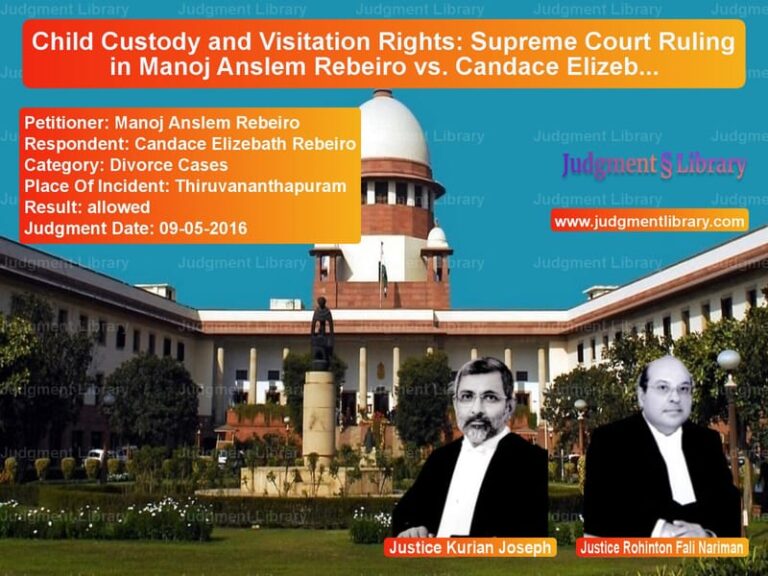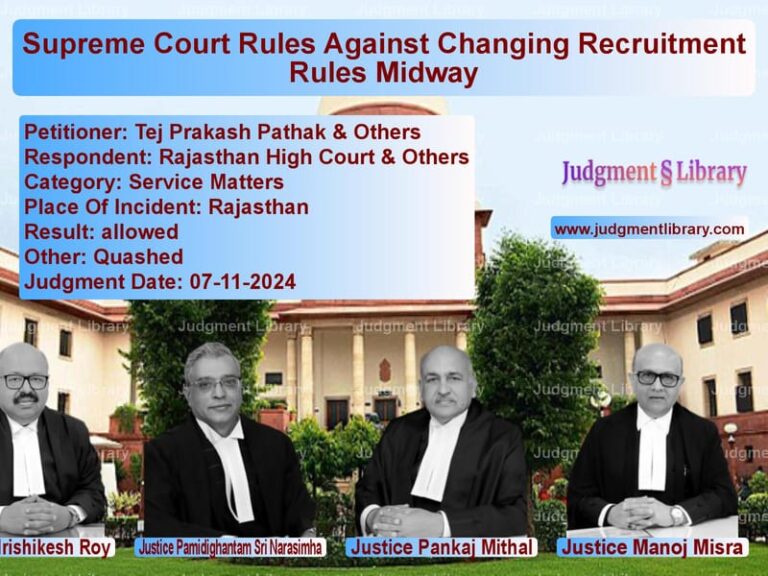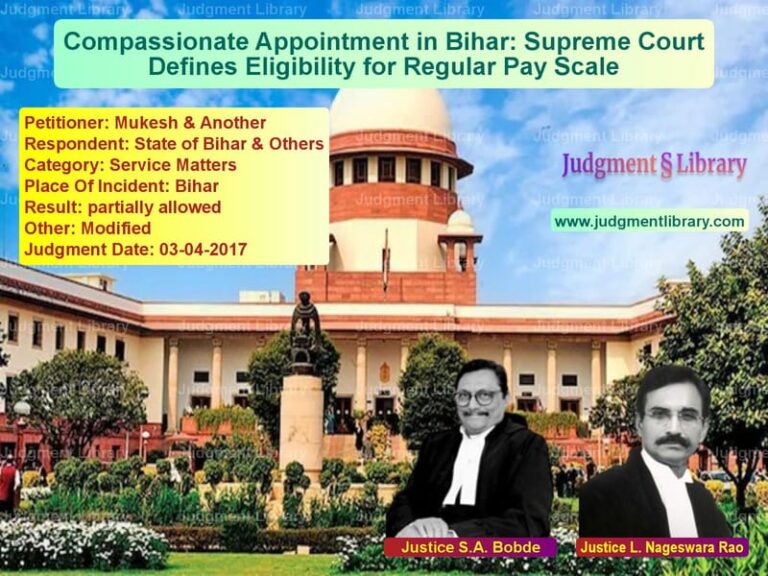Supreme Court Acquits Appellant in Robbery Case Due to Lack of Evidence
The case of Anwar @ Bhugra v. State of Haryana involves a criminal appeal where the appellant was convicted for robbery and possession of illegal firearms. The Supreme Court was tasked with determining whether the prosecution had successfully established the appellant’s guilt beyond a reasonable doubt.
In its judgment, the Supreme Court overturned the conviction and quashed the sentence, citing inconsistencies in witness statements, lack of credible evidence, and procedural lapses. This ruling emphasizes the principle that an accused person should be convicted only when the prosecution proves the case beyond reasonable doubt.
Background of the Case
Anwar @ Bhugra was convicted by the trial court under Sections 394 and 397 of the Indian Penal Code (IPC) and Section 25 of the Arms Act, 1959. The allegations stemmed from an incident on April 4, 1994, when the complainant, Jahid (PW-4), was allegedly robbed near a cremation ground while returning to his village after purchasing groceries.
According to the complainant, three individuals armed with a drant (sharp farming tool), knife, and pistol intercepted him and demanded his belongings. They assaulted him and forcibly took his wristwatch. Two witnesses, Harun Ali (PW-6) and Jain Singh (PW-5), were passing by on a tractor and attempted to intervene, but they were also assaulted and robbed.
One of the accused, Satpal, was apprehended at the scene but later escaped. The appellant, Anwar @ Bhugra, was arrested on April 12, 1994, and a country-made pistol was allegedly recovered from his possession, leading to a separate FIR under the Arms Act.
Arguments by the Parties
Arguments by the Appellant (Anwar @ Bhugra)
- The appellant argued that the prosecution’s case was entirely fabricated and that no such robbery took place.
- The alleged weapon (pistol) was never used during the crime, making its recovery irrelevant to the case.
- The prosecution’s own evidence was contradictory, as the personal search memo at the time of arrest indicated no recovery, while a separate memo later stated that a pistol was found in the appellant’s possession.
- Two key witnesses, Jain Singh (PW-5) and Harun Ali (PW-6), turned hostile and denied the prosecution’s version of events.
- The FIR did not mention the appellant as one of the robbers, and no identification parade was conducted.
Arguments by the Respondent (State of Haryana)
- The prosecution argued that the complainant and the arresting officers had consistently identified the appellant as one of the robbers.
- The recovery of the pistol further established the appellant’s involvement in the crime.
- Despite some witnesses turning hostile, their initial statements supported the prosecution’s case.
- The trial court and the High Court had already considered the evidence and found the appellant guilty, making further interference unwarranted.
Supreme Court’s Legal Analysis
Inconsistencies in Prosecution Evidence
The Supreme Court observed that there were serious inconsistencies in the prosecution’s case:
“The complainant and official witnesses claim that the appellant was carrying a pistol, yet there is nothing in the complaint or medical report to suggest that the weapon was ever used.”
Doubtful Recovery of the Pistol
The Court highlighted the contradiction in the recovery process:
“The memo of the appellant’s personal search states that nothing was found at the time of his arrest. However, another memo claims that a country-made pistol was recovered from his left pocket. This raises serious doubts about the reliability of the recovery.”
Read also: https://judgmentlibrary.com/supreme-court-cancels-bail-of-drug-trafficking-kingpin-ajay-kumar-singh/
Hostile Witnesses
Two key witnesses, Jain Singh (PW-5) and Harun Ali (PW-6), did not support the prosecution’s case:
- Jain Singh denied witnessing any crime and stated that his signatures were obtained on blank papers.
- Harun Ali was declared hostile and refuted claims that the appellant was present at the scene.
Failure to Establish the Appellant’s Presence
The Court found discrepancies in the complainant’s statements:
- In the FIR, the complainant initially mentioned that one of the robbers snatched his purse, but in his deposition, he claimed it was specifically the appellant who took it.
- Another material witness, Mahinder Singh, who allegedly saw the robbers escape, was never examined by the prosecution.
Final Judgment by the Supreme Court
The Supreme Court ruled:
- The evidence presented by the prosecution failed to establish the appellant’s guilt beyond a reasonable doubt.
- The contradictions in witness statements and procedural lapses undermined the prosecution’s case.
- The recovery of the pistol was unreliable, and its alleged connection to the crime was unproven.
- The conviction and sentence awarded by the trial court and upheld by the High Court were set aside.
- The appellant was acquitted of all charges.
- His bail bonds were cancelled, and he was ordered to be released immediately.
Impact of the Judgment
- Reinforces the Principle of Beyond Reasonable Doubt: The ruling highlights that conviction must be based on clear, consistent, and credible evidence.
- Prevents Misuse of Criminal Law: The judgment ensures that individuals are not convicted based on weak and contradictory evidence.
- Protects Accused Rights: The ruling strengthens legal protections against wrongful convictions based on fabricated evidence.
- Calls for Stronger Investigative Procedures: The decision underscores the need for law enforcement agencies to follow proper procedures, including identification parades and reliable recovery documentation.
Conclusion
The Supreme Court’s decision in Anwar @ Bhugra v. State of Haryana reinforces the fundamental principles of criminal justice. The ruling highlights the need for reliable evidence, strict adherence to legal procedures, and the protection of the rights of the accused. By quashing the conviction, the Court has upheld the principle that no individual should be punished unless their guilt is proven beyond a reasonable doubt.
Petitioner Name: Anwar @ Bhugra.Respondent Name: State of Haryana.Judgment By: Justice Abhay S. Oka, Justice Rajesh Bindal.Place Of Incident: Haryana.Judgment Date: 29-03-2023.
Don’t miss out on the full details! Download the complete judgment in PDF format below and gain valuable insights instantly!
Download Judgment: anwar-@-bhugra-vs-state-of-haryana-supreme-court-of-india-judgment-dated-29-03-2023.pdf
Directly Download Judgment: Directly download this Judgment
See all petitions in Fraud and Forgery
See all petitions in Theft and Robbery Cases
See all petitions in Judgment by Abhay S. Oka
See all petitions in Judgment by Rajesh Bindal
See all petitions in allowed
See all petitions in Quashed
See all petitions in supreme court of India judgments March 2023
See all petitions in 2023 judgments
See all posts in Criminal Cases Category
See all allowed petitions in Criminal Cases Category
See all Dismissed petitions in Criminal Cases Category
See all partially allowed petitions in Criminal Cases Category







